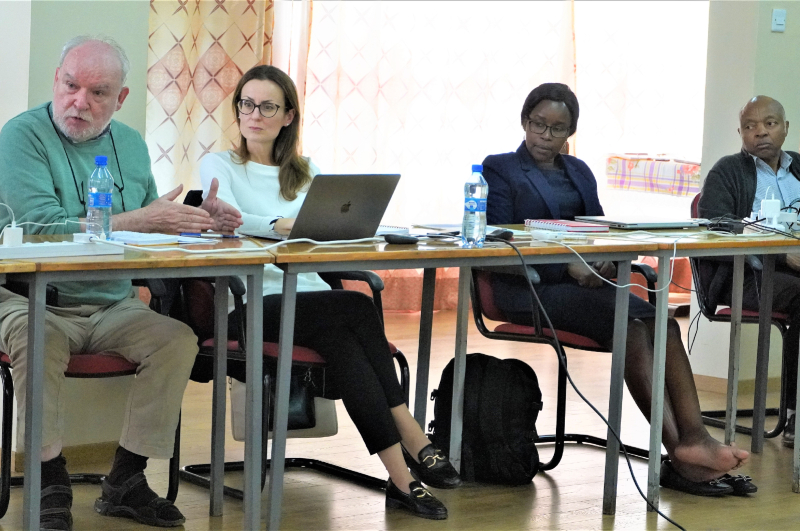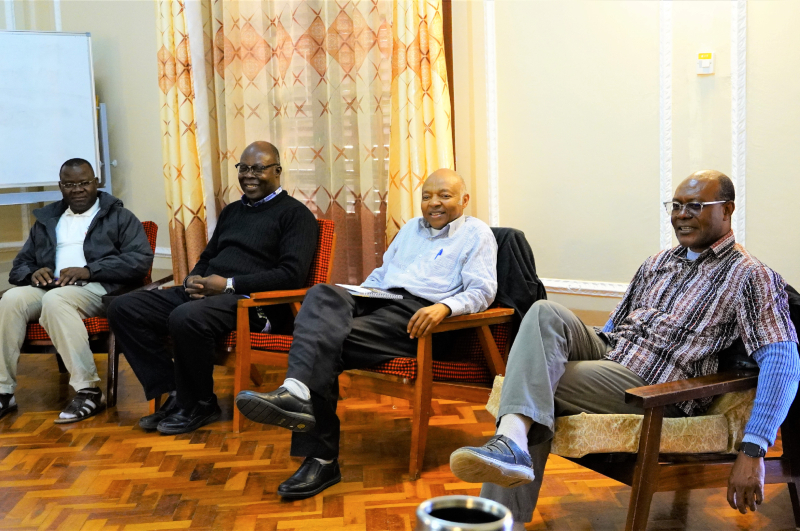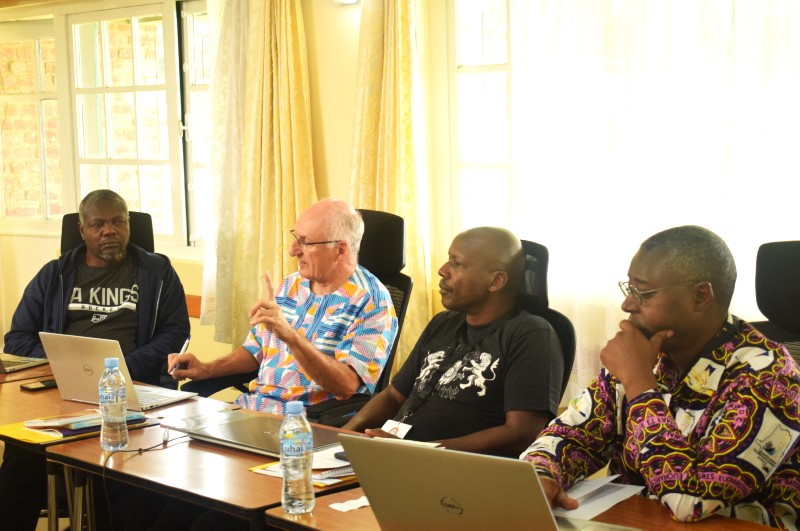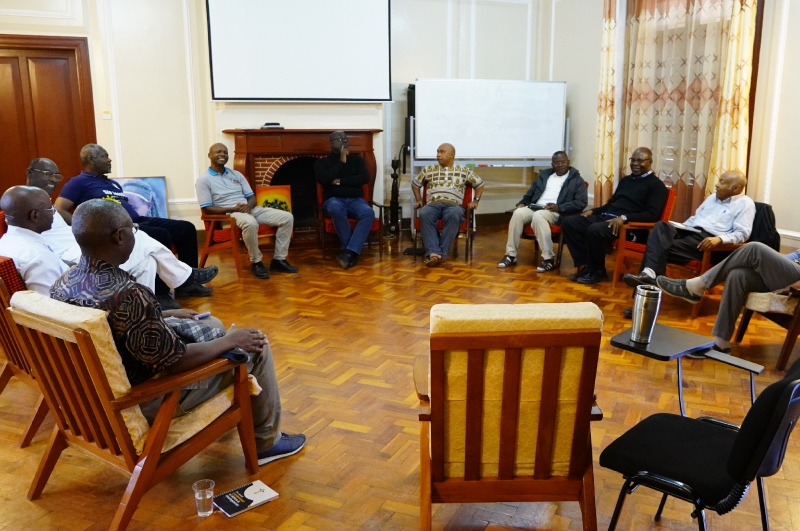



The 68th bi-annual JCAM plenary was held in Abuja-Nigeria from the 15th to the 19th of April 2024 on the premises of the newly constructed Nursery and Primary School, which is part of Loyola Jesuit College Abuja.
All the Major Superiors and Fr. Fratern Masawe, SJ, Father General’s Assistant for Africa and Madagascar, were present. Also present for this session was Father Sebastian Jeerakassery, SJ, the Treasurer General of the Society of Jesus.
The first two days of the meeting were dedicated to a seminar on the newly promulgated Statute on Religious Poverty and the Instruction on the Administration of Finances (SOP/IAF) led by Fr. Jeerakassery. It was a moment of fraternal conversation around the various aspects of the document and an update on the spirituality of religious poverty. Commenting on the first part of the document dedicated to religious poverty, Fr. Jeerakassery pointed out that very little had changed from the previous version. Major Superiors were invited to encourage communities and works to use the new document for prayer and as a tool for their ministry.
There was a more significant change in the Instruction on the Administration of Finances, beginning with the document’s name, which used to be the Instruction on the Administration of Goods (IAG). This change, although providing the same nomenclature across all language groups, was more than just a cosmetic adjustment. The first part of the conversation around the IAF was about the changes that had been made and explaining their rationale. Subsequently, Fr. Jeerakassery highlighted the numbers that referred to the role of the Major Superiors and how this reference could be better used. This opened the way for a healthy debate covering the various responsibilities identified in the document. It was a very enriching conversation, and Major Superiors thanked Fr. Jeerakassery for his time and dedication in accepting the opportunity to be available for this plenary session.
The remaining three days of the plenary were dedicated to the agenda items of the meeting, which covered matters touching on formation, the JCAM Conference, and the universal Society. The April session of the bi-annual meeting is usually devoted to issues around formation houses. It comes after the various board meetings, and there is always a report from each board. There was an uptick in the number of men ordained in Hekima and ITCJ, which was a sign of growing numbers. There was also a consideration of the personnel destined for formation houses, including those who were leaving and those who were coming. Although there were many candidates proposed for the medium and long term, it was a lean harvest for the short term as very few people available to work in formation houses were finishing their formation in the short term.
It is also customary for Major Superiors to look at trans-provincial issues requiring prayer and discernment. A progress report on items highlighted in the JCAM Apostolic Directions, 2022-2026, was presented. Issues under consideration included networking and collaboration, building leadership capacity within the Conference, anticipating and providing for the needs of the Universal Society, and Promoting a Consistent Culture of Protection (PCCP) and safeguarding within the Provinces and Region of JCAM. While there is still a long way to go in each of these areas, there was tangible progress and a desire to continue to build cross-province networks that facilitate these values. There was also a beneficial conversation around climate change research and advocacy. Aware that the continent was the worst hit by global climate change, Major Superiors reflected on how the Society could be more impactful through collaboration with other actors within the Church and beyond for research and advocacy.
On another note, Father Patrick Etamesor, SJ, the Regional Director for JRS West Africa, was invited to speak about Jesuit Refugee Service (JRS) initiatives within the Conference and how JRS could collaborate more closely with province initiatives, especially advocacy. It was a fraternal conversation that produced some excellent proposals for future action. Trans-conference collaboration is also becoming very important at the level of the universal Society, especially in enhancing partnerships around formation. This was part of the conversations to promote awareness and explore avenues of collaboration with other conferences like the Jesuit Conference of Canada and the United States (JCCU) and the Jesuit Conference of European Provincials (JCEP).
The hospitality of ANW Province was on display during this meeting. The Provincial Father John Ghansah, SJ, whose birthday fell within the plenary, was celebrated by students and Jesuits at LJC. Similarly, Fr. José Minaku, SJ, the JCAM President, was invited to preside over a morning mass with the students of LJC. On the last day of the meeting, Major Superiors were invited to plant trees in the courtyard of the nursery school to encourage participation in ecological awareness.
As the meeting ended, Major Superiors thanked the Provincial of ANW province, Father John Ghansah, and his Chief of Staff, Fr. Eziokwubundu Amadi, SJ, for coordinating the logistics and organizing a fruitful meeting. They were also immensely grateful to Fr. Itua Egbor, SJ, the local community superior, and his community for being gracious hosts. Fr. Peter Chidolue, SJ, the President of LJC, and the entire school community also received thanks for hosting the meeting and providing for the needs of Major Superiors during the whole week.
The next JCAM plenary is scheduled for Kigali, Rwanda, from the 21st to the 25th of October 2024 and will coincide with the celebration of the twenty-fifth anniversary of the RWB Region.
Related Articles


Select Payment Method
Pay by bank transfer
If you wish to make a donation by direct bank transfer please contact Fr Paul Hamill SJ treasurer@jesuits.africa. Fr Paul will get in touch with you about the best method of transfer for you and share account details with you. Donations can be one-off gifts or of any frequency; for example, you might wish to become a regular monthly donor of small amounts; that sort of reliable income can allow for very welcome forward planning in the development of the Society’s works in Africa and Madagascar.
Often it is easier to send a donation to an office within your own country and Fr Paul can advise on how that might be done. In some countries this kind of giving can also be recognised for tax relief and the necessary receipts will be issued.



